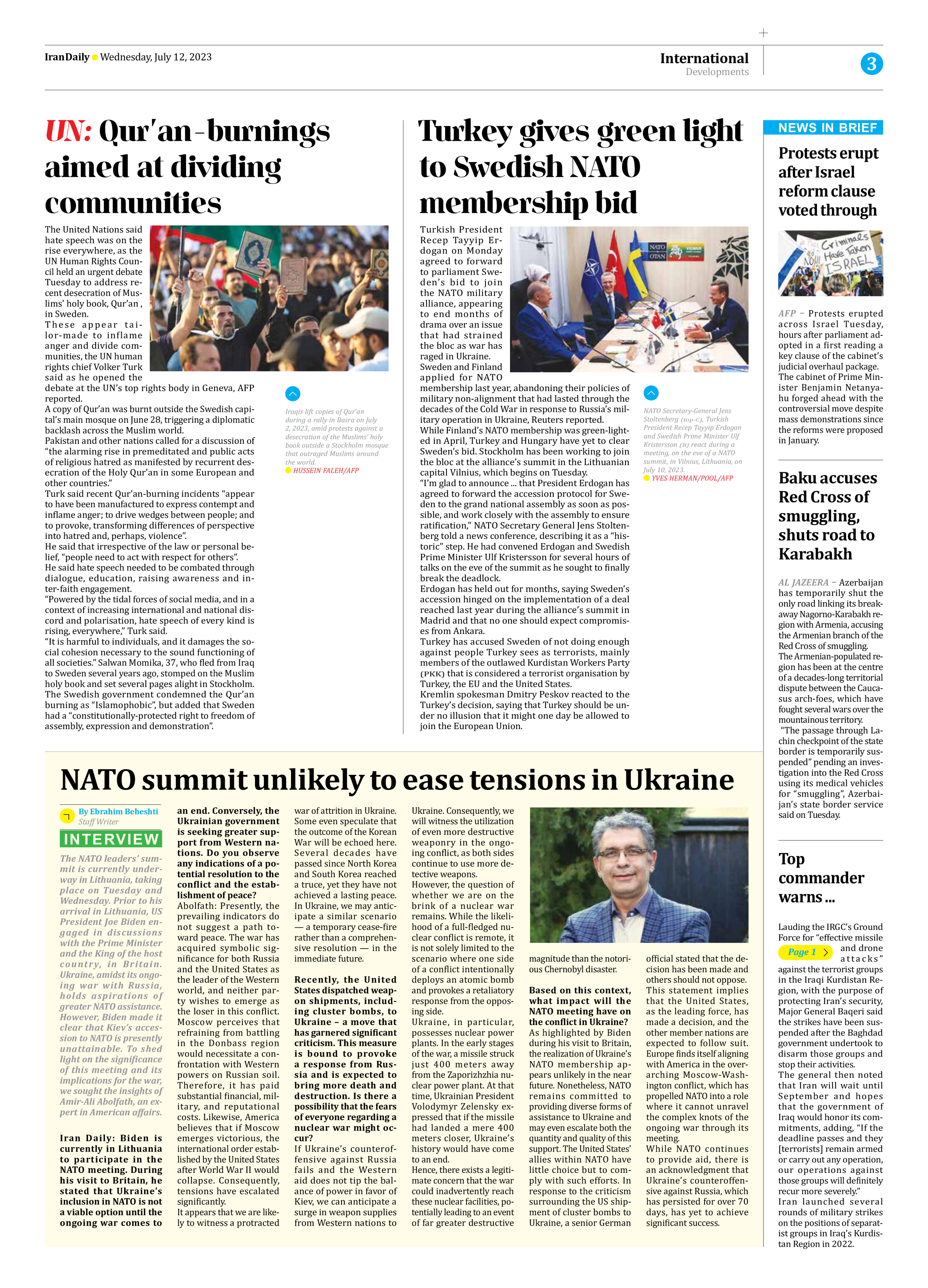
NATO summit unlikely to ease tensions in Ukraine
By Ebrahim Beheshti
Staff Writer
The NATO leaders’ summit is currently underway in Lithuania, taking place on Tuesday and Wednesday. Prior to his arrival in Lithuania, US President Joe Biden engaged in discussions with the Prime Minister and the King of the host country, in Britain. Ukraine, amidst its ongoing war with Russia, holds aspirations of greater NATO assistance. However, Biden made it clear that Kiev’s accession to NATO is presently unattainable. To shed light on the significance of this meeting and its implications for the war, we sought the insights of Amir-Ali Abolfath, an expert in American affairs.
Iran Daily: Biden is currently in Lithuania to participate in the NATO meeting. During his visit to Britain, he stated that Ukraine’s inclusion in NATO is not a viable option until the ongoing war comes to an end. Conversely, the Ukrainian government is seeking greater support from Western nations. Do you observe any indications of a potential resolution to the conflict and the establishment of peace?
Abolfath: Presently, the prevailing indicators do not suggest a path toward peace. The war has acquired symbolic significance for both Russia and the United States as the leader of the Western world, and neither party wishes to emerge as the loser in this conflict. Moscow perceives that refraining from battling in the Donbass region would necessitate a confrontation with Western powers on Russian soil. Therefore, it has paid substantial financial, military, and reputational costs. Likewise, America believes that if Moscow emerges victorious, the international order established by the United States after World War II would collapse. Consequently, tensions have escalated significantly.
It appears that we are likely to witness a protracted war of attrition in Ukraine. Some even speculate that the outcome of the Korean War will be echoed here. Several decades have passed since North Korea and South Korea reached a truce, yet they have not achieved a lasting peace. In Ukraine, we may anticipate a similar scenario — a temporary cease-fire rather than a comprehensive resolution — in the immediate future.
Recently, the United States dispatched weapon shipments, including cluster bombs, to Ukraine – a move that has garnered significant criticism. This measure is bound to provoke a response from Russia and is expected to bring more death and destruction. Is there a possibility that the fears of everyone regarding a nuclear war might occur?
If Ukraine’s counteroffensive against Russia fails and the Western aid does not tip the balance of power in favor of Kiev, we can anticipate a surge in weapon supplies from Western nations to Ukraine. Consequently, we will witness the utilization of even more destructive weaponry in the ongoing conflict, as both sides continue to use more detective weapons.
However, the question of whether we are on the brink of a nuclear war remains. While the likelihood of a full-fledged nuclear conflict is remote, it is not solely limited to the scenario where one side of a conflict intentionally deploys an atomic bomb and provokes a retaliatory response from the opposing side.
Ukraine, in particular, possesses nuclear power plants. In the early stages of the war, a missile struck just 400 meters away from the Zaporizhzhia nuclear power plant. At that time, Ukrainian President Volodymyr Zelensky expressed that if the missile had landed a mere 400 meters closer, Ukraine’s history would have come to an end.
Hence, there exists a legitimate concern that the war could inadvertently reach these nuclear facilities, potentially leading to an event of far greater destructive magnitude than the notorious Chernobyl disaster.
Based on this context, what impact will the NATO meeting have on the conflict in Ukraine?
As highlighted by Biden during his visit to Britain, the realization of Ukraine’s NATO membership appears unlikely in the near future. Nonetheless, NATO remains committed to providing diverse forms of assistance to Ukraine and may even escalate both the quantity and quality of this support. The United States’ allies within NATO have little choice but to comply with such efforts. In response to the criticism surrounding the US shipment of cluster bombs to Ukraine, a senior German official stated that the decision has been made and others should not oppose.
This statement implies that the United States, as the leading force, has made a decision, and the other member nations are expected to follow suit. Europe finds itself aligning with America in the overarching Moscow-Washington conflict, which has propelled NATO into a role where it cannot unravel the complex knots of the ongoing war through its meeting.
While NATO continues to provide aid, there is an acknowledgment that Ukraine’s counteroffensive against Russia, which has persisted for over 70 days, has yet to achieve significant success.







